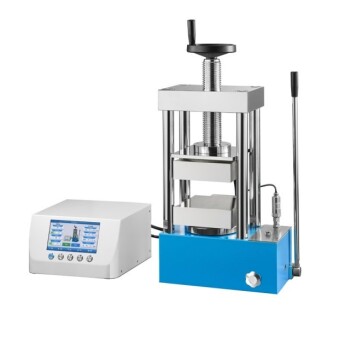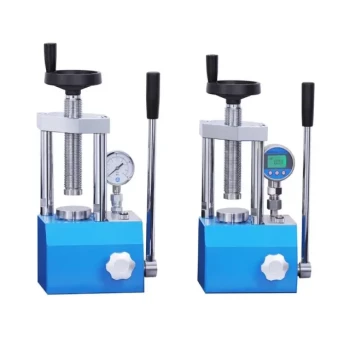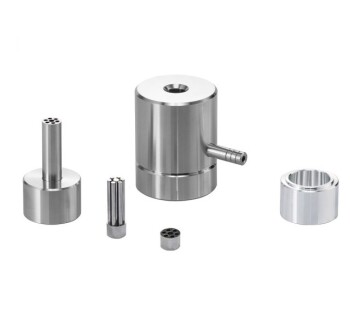The core advantages of a hydraulic heat press are its ability to deliver immense, consistent force with exceptional precision. Combined with heat, this allows for highly repeatable and efficient bonding, shaping, or compression of materials, making it a superior choice for applications where quality and consistency are critical.
A hydraulic heat press is not just about applying pressure; it's about applying the exact right amount of pressure, consistently, every single time. This control is the fundamental reason it excels in both demanding industrial production and precise laboratory environments.

How Hydraulic Force Delivers Superior Performance
A standard mechanical or manual press relies on levers and screws, where the force applied can vary. A hydraulic press uses an incompressible fluid to multiply a small input force into a much larger output force, governed by Pascal's principle.
The Principle of Force Multiplication
The hydraulic system pushes fluid into a cylinder, moving a piston that drives the press platen. Because the fluid cannot be compressed, the force is distributed perfectly evenly and can be maintained without fluctuation for the duration of the press cycle.
This simple principle is the source of its primary advantages.
The Key Advantages of a Hydraulic System
When you combine a hydraulic force system with heated platens, you gain several distinct operational benefits over manual or pneumatic alternatives.
Unmatched Force and Consistency
A hydraulic press delivers an unwavering amount of force throughout the entire stroke. This eliminates the variability common in manual presses, ensuring every item produced receives the exact same pressure.
This consistency is crucial for creating uniform products, from bonding composite materials to preparing identical lab samples.
Precision Control Over Pressure and Heat
Modern hydraulic presses, especially electric-hydraulic models, offer granular control over the process. Operators can precisely set and automate the pressure, temperature, and cycle time.
Many units feature digital interfaces or touchscreens, allowing for custom programs to be saved and repeated, which guarantees process repeatability with minimal operator effort.
High Operational Efficiency
By applying intense pressure and heat simultaneously, a hydraulic press significantly reduces the processing time required to bond or cure materials.
This efficiency not only increases throughput in a production setting but also conserves energy compared to longer, less-controlled heating and pressing cycles.
Versatility Across Applications
The combination of high force and precise control makes these presses suitable for an incredibly wide range of materials and tasks.
They are used in industrial manufacturing, polymer and pharmaceutical labs for sample preparation (like KBr pellets), and in undergraduate chemistry settings. Their ability to handle diverse materials makes them a flexible asset.
Understanding the Trade-offs and Considerations
While powerful, a hydraulic heat press is not the right tool for every single job. Understanding its limitations is key to making an informed decision.
Footprint and Infrastructure
Full-size industrial hydraulic presses can be large, heavy, and require significant floor space. While smaller "mini" benchtop versions exist for labs, the core technology often demands a more substantial footprint than a simple manual press.
Initial Cost vs. Long-Term Value
The initial investment for a hydraulic press is typically higher than for manual or some pneumatic systems. However, their longevity, minimal maintenance requirements, and the high quality of their output often make them more cost-effective over the long term, especially in high-use environments.
Maintenance and Safety
While generally requiring low maintenance, hydraulic systems do contain fluid that must be monitored and eventually replaced. They also incorporate critical safety features to prevent overloading, which protects both the operator and the machine from damage due to excessive force.
Making the Right Choice for Your Application
To select the right press, you must align its capabilities with your primary goal.
- If your primary focus is industrial production: The consistent, high force of a hydraulic press ensures product uniformity and high throughput, maximizing quality and efficiency.
- If your primary focus is laboratory research: The precision, control, and repeatability of a hydraulic system are essential for creating reliable samples and generating trustworthy data.
- If your primary focus is working in a small lab with limited space: A compact mini hydraulic press offers the benefits of precise force in a portable, benchtop-friendly design.
Ultimately, choosing a hydraulic heat press is a decision to prioritize control and consistency in your work.
Summary Table:
| Advantage | Description |
|---|---|
| Unmatched Force and Consistency | Delivers unwavering force for uniform products and reliable sample preparation. |
| Precision Control Over Pressure and Heat | Granular, automated settings ensure repeatability and minimal operator effort. |
| High Operational Efficiency | Reduces processing time and energy use, increasing throughput in production. |
| Versatility Across Applications | Suitable for industrial manufacturing, polymer labs, and pharmaceutical sample prep. |
Ready to enhance your material processing with precision and efficiency? KINTEK specializes in lab press machines, including automatic lab presses, isostatic presses, and heated lab presses, designed to deliver consistent force and exact control for your laboratory needs. Whether you're in industrial production or research, our solutions ensure high-quality results and long-term value. Contact us today to discuss how our hydraulic heat presses can optimize your workflow!
Visual Guide

Related Products
- Automatic Heated Hydraulic Press Machine with Hot Plates for Laboratory
- 24T 30T 60T Heated Hydraulic Lab Press Machine with Hot Plates for Laboratory
- Automatic High Temperature Heated Hydraulic Press Machine with Heated Plates for Lab
- Automatic Heated Hydraulic Press Machine with Heated Plates for Laboratory
- Laboratory Split Manual Heated Hydraulic Press Machine with Hot Plates
People Also Ask
- What are the industrial applications of a hydraulic heat press? Powering Lamination, Bonding, and R&D Efficiency
- What is a heated hydraulic press and what are its main components? Discover Its Power for Material Processing
- What are the key technical requirements for a hot press machine? Mastering Pressure and Thermal Precision
- Why is it necessary to use heating equipment for the dewatering of hempseed oil biodiesel? Expert Quality Guide
- What specific conditions does a heated laboratory hydraulic press provide? Optimize Dry Electrode Prep with PVDF



















